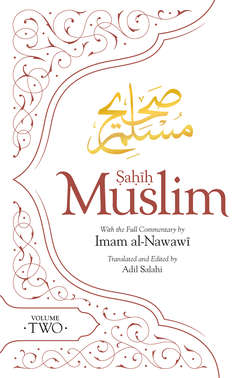Читать книгу Sahih Muslim (Volume 2) - Imam Abul-Husain Muslim - Страница 18
На сайте Литреса книга снята с продажи.
ОглавлениеCHAPTER 29
ON THE PROPHET’S WORDS: TO REVILE A MUSLIM IS TRANSGRESSION AND TO FIGHT HIM IS DISBELIEF
[120–116]. (Dar al-Salam 0122) Muhammad ibn Bakkar ibn al-Rayyan and [Awn ibn Sallam narrated:i both said: Muhammad ibn Talhah narrated [H]. Muhammad ibn al-Muthanna narrated: [Abd al-Rahman ibn Mahdi narrated; Sufyan narrated [H]. Also Muhammad ibn al-Muthanna narrated: Muhammad ibn Ja[far narrated; Shu[bah narrated; all of them from Zubayd; from Abu Wa’il; from [Abdullah ibn Mas[ud: ‘God’s Messenger (peace be upon him) said: “To revile a Muslim is transgression and to fight him is disbelief”.’ Zubayd said: I said to Abu Wa’il: ‘Was it you that heard [Abdullah reporting it from God’s Messenger (peace be upon him)?’ He said: ‘Yes’.
Shu[bah’s narration does not include what Zubayd said to Abu Wa’il.
حَدَّثَنَا مُحَمَّدُ بْنُ بَكَّارِ بْنِ الرَّيَّانِ، وَعَوْنُ بْنُ سَلاَّمٍ، قَالا: حَدَّثَنَا مُحَمَّدُ بْنُ طَلْحَةَ، ح. وَحَدَّثَنَا مُحَمَّدُ بْنُ الْـمُثَنَّى، حَدَّثَنَا عَبْدُ الرَّحْمَنِ بْنُ مَهْدِيٍّ، حَدَّثَنَا سُفْيَانُ ح. وَحَدَّثَنَا مُحَمَّدُ بْنُ الْـمُثَنَّى، حَدَّثَنَا مُحَمَّدُ بْنُ جَعْفَرٍ، حَدَّثَنَا شُعْبَةُ: كُلُّهُمْ عَنْ زُبَيْدٍ، عَنْ أَبِي وَائِلٍ، عَنْ عَبْدِ اللهِ بْنِ مَسْعُودٍ قَالَ: قَالَ رَسُولُ اللهِ صَلَّى اللهُ عَلَيْهِ وَسَلَّمَ: «سِبَابُ الْـمُسْلِمِ فُسُوقٌ، وَقِتَالُهُ كُفْرٌ». قَالَ زُبَيْدٌ: فَقُلْتُ لأَبِي وَائِلٍ: أَنْتَ سَمِعْتَهُ مِنْ عَبْدِ اللهِ يَرْوِيهِ عَنْ رَسُولِ اللهِ صَلَّى اللهُ عَلَيْهِ وَسَلَّمَ؟ قَالَ: نَعَمْ. وَلَيْسَ فِي حَدِيثِ شُعْبَةَ قَوْلُ زُبَيْدٍ لأَبِي وَائِلٍ.
[000–117]. (Dar al-Salam 0123) Abu Bakr ibn Shaybah and Ibn al-Muthanna narrated:11 from Muhammad ibn Ja[far; from Shu[bah; from Mansur [H]. Also Ibn Numayr narrated: [Affan narrated; from Shu[bah; from al-A[mash; both from Abu Wa’il; from [Abdullah; from the Prophet: the same.i
حَدَّثَنَا أَبُو بَكْرِ بْنُ أَبِي شَيْبَةَ، وَابْنُ الْـمُثَنَّى، عَنْ مُحَمَّدِ بْنِ جَعْفَرٍ، عَنْ شُعْبَةَ، عَنْ مَنْصُورٍ ح. وَحَدَّثَنَا ابْنُ نُمَيْرٍ، حَدَّثَنَا عَفَّانُ، حَدَّثَنَا شُعْبَةُ، عَنِ الأَعْمَشِ، كِلاَهُمَا عَنْ أَبِي وَائِلٍ، عَنْ عَبْدِ اللهِ، عَنِ النَّبِيِّ صَلَّى اللهُ عَلَيْهِ وَسَلَّمَ: بِمِثْلِهِ.
Text Explanation
11. Linguistically speaking, to revile means to speak abusively of someone in a way that puts him to shame in society. From the Islamic point of view, transgression means to abandon obedience. The hadith means that unwarranted reviling of a Muslim is forbidden, according to the unanimous verdict of the Muslim community. Whoever does so is a transgressor, as the Prophet makes clear. To fight him without justification does not take a person out of the religion of Islam unless one considers this lawful, as we have already stated more than once. Therefore, the hadith is explained in various ways: 1) It applies to one who considers it lawful; 2) it means a denial of God’s bounty and the brotherhood of Islam, not a denial of Islam altogether; 3) it eventually leads to disbelief; and 4) it is akin to what unbelievers do; but God knows best.
For a Muslim to fight another Muslim appears to mean normal fighting. Qadi [Iyad, however, says that it may mean physical hitting and pushing, but God knows best.
Transmission
The chain of transmission includes Muhammad ibn Bakkar ibn al-Rayyan and Zubayd, who is Zubayd ibn al-Harith al-Yami, or al-Iyami, who is the only one mentioned in the two Sahih anthologies with this name and affiliation. The chain of transmission also includes Abu Wa’il, whose name is Shaqiq ibn Salamah.
The chain of transmission of the first version of this hadith includes three different routes meeting at Zubayd. This is how the hadith is reported in several original copies, but in some copies accepted by Shaykh Abu [Amr ibn al-Salah it is given in two routes, omitting the one of Muhammad ibn al-Muthanna from Ibn Mahdi from Sufyan.
i.Related by al-Bukhari, 48; al-Tirmidhi, 1983 and 2635; al-Nasa’i, 4120 and 4121.
i.Related by al-Bukhari, 6044 and 7076; al-Nasa’i, 4120, 4122, 4223 and 4224; Ibn Majah, 69.
